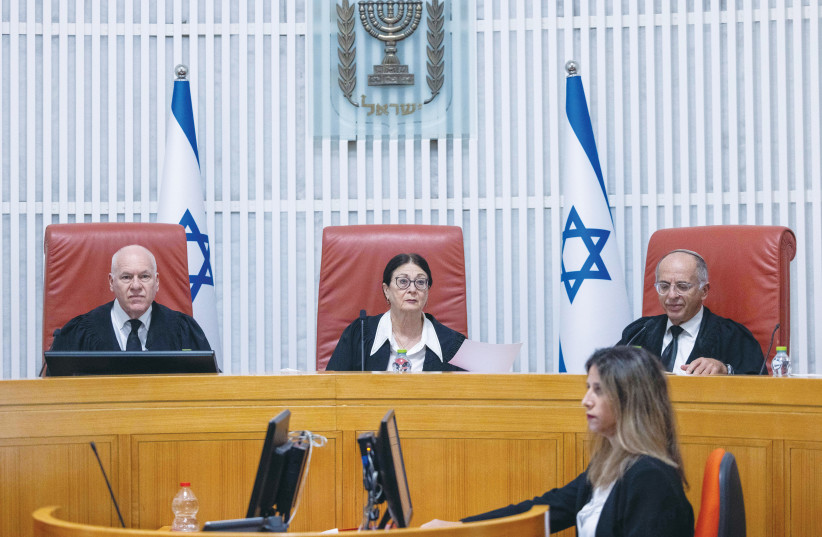Israel needs judicial reform, but not 'this' judicial reform - opinion

The override clause, which would give the Knesset power to overturn a court decision by a simple majority of 61, is ridiculous and makes a complete mockery of the court
During the last decade, I have often written in these pages about Judaism and Israel, based on a lifetime of study in both yeshiva and the academy. Today, I am writing based on no formal study or credentials; just as a plain citizen of this amazing miracle called Israel.
Israel was founded as both a Jewish state and a democracy and has lived the past 75 years with that tension. The question is not only how Israel can privilege the Jewish character of the state without hurting the rights of its non-Jewish citizens but even the rights of its Jewish citizens as well. The classic example would be the question of public transportation on Shabbat.
Israel’s religious population can rightly object to municipal public transportation on Shabbat as an affront to the Jewish character of Israel. But even though there is no infringement on the use of private cars to travel on Shabbat, it discriminates against those in lower socioeconomic groups or ages who do not own an automobile. So if public transport is viewed as an essential service, even a right, how does one ban it on Shabbat, as it severely disadvantages those who do not own cars?
I don’t know. But this is just one small example of literally thousands of times that the Jewish character of the state clashes with its democratic nature.
One of the many problems with democracy is that most people think it means the rule of the majority and not the rule of the people. Democracy does not give the power of the majority to trample the rights of a minority. A majority cannot vote to take all the money away from the minority.
If we had to vote on whether to eat pizza or hamburgers for lunch and the majority voted for hamburgers, that would be fine unless the minority who voted for pizza are vegetarians and cannot eat hamburgers, while the hamburger voters can eat pizza but simply prefer burgers as a matter of taste.
It is the job of the courts to advocate for the minority and to make sure that their rights aren’t trampled by the majority. In a state with a constitution, the legislation can vote for a law and the Supreme Court can determine the legality of the law based on the guarantees and rights laid down in the constitution.
However, Israel has no constitution. Israel’s Declaration of Independence promised that one would be adopted “not later than October 1, 1948,” during which time Israel was fighting for its life. And after the war, Israel was busy housing the more than 700,000 new immigrants who flooded the country. Israel just never got around to it. So now we are here.
Judicial reform is good, but not "this" judicial reform
AS SOMEONE who has lived in this country for nearly 30 years, I am a strong believer in judicial reform. I am not a jurist, but it seems obvious to me that the judicial activism which fills the vacuum left by Israel’s lack of a constitution represents a vast overstep into the legislative branch of our government.
But “the” judicial reform, as being put forth by the government, is simply too much.
I don’t know enough about the “reasonability” cause to really opine. As an American, I am familiar with justice Potter Stewart’s phrase in trying to define obscenity – “I know it when I see it” – and I agree with that as a determination, but I do not know enough about how much this comes to play in our courts here.
I do want the legislation to have more of a say in picking our judges. The Knesset represents the people, and the people should have a say in who judges them. I think that the government plan is fair and will work in the favor of the opposition when it is their turn to be in power.
But the override clause, which would give the Knesset power to overturn a court decision by a simple majority of 61, is ridiculous and makes a complete mockery of the court. It is shocking to me that anyone would ever propose such a thing without realizing that.
Perhaps the most shocking thing is the complete deafness demonstrated by the government to the more than 10 weeks of large-scale protests. I do believe that at least some of the protests against the judicial reform are really a protest against the right-wing government in the guise of the reform. But still, hundreds of thousands of people are coming out week after week, saying again and again that they do not want this. Why does the government think it can just push this through against the vehement opposition of so many people?
As educated as I am, and as much as I think of myself as a basically good person, I am constantly second-guessing myself. I am always looking over my shoulder and ready to hear the criticisms of my wife, friends and colleagues. If I wanted to make it mandatory to put seat belts in cars and met such opposition, it would make me think twice. I just don’t understand what the government is thinking. Why is it not demonstrating that it is hearing the opposition?
And I will second guess, even as I write this, and say that perhaps I have it all wrong. As I said, I am not a legal expert. But then, the government did a terrible job explaining to the public what it is doing and why.
Of course, the answer to solving most of these issues is something that is probably impossible to do: write and adopt a constitution for Israel. But until those messianic times, we need a compromise that makes sense to the public, and move on. ■
The writer holds a doctorate in Jewish philosophy and teaches in post-high school yeshivas and seminaries in Jerusalem.
Jerusalem Post Store
`; document.getElementById("linkPremium").innerHTML = cont; var divWithLink = document.getElementById("premium-link"); if (divWithLink !== null && divWithLink !== 'undefined') { divWithLink.style.border = "solid 1px #cb0f3e"; divWithLink.style.textAlign = "center"; divWithLink.style.marginBottom = "15px"; divWithLink.style.marginTop = "15px"; divWithLink.style.width = "100%"; divWithLink.style.backgroundColor = "#122952"; divWithLink.style.color = "#ffffff"; divWithLink.style.lineHeight = "1.5"; } } (function (v, i) { });

